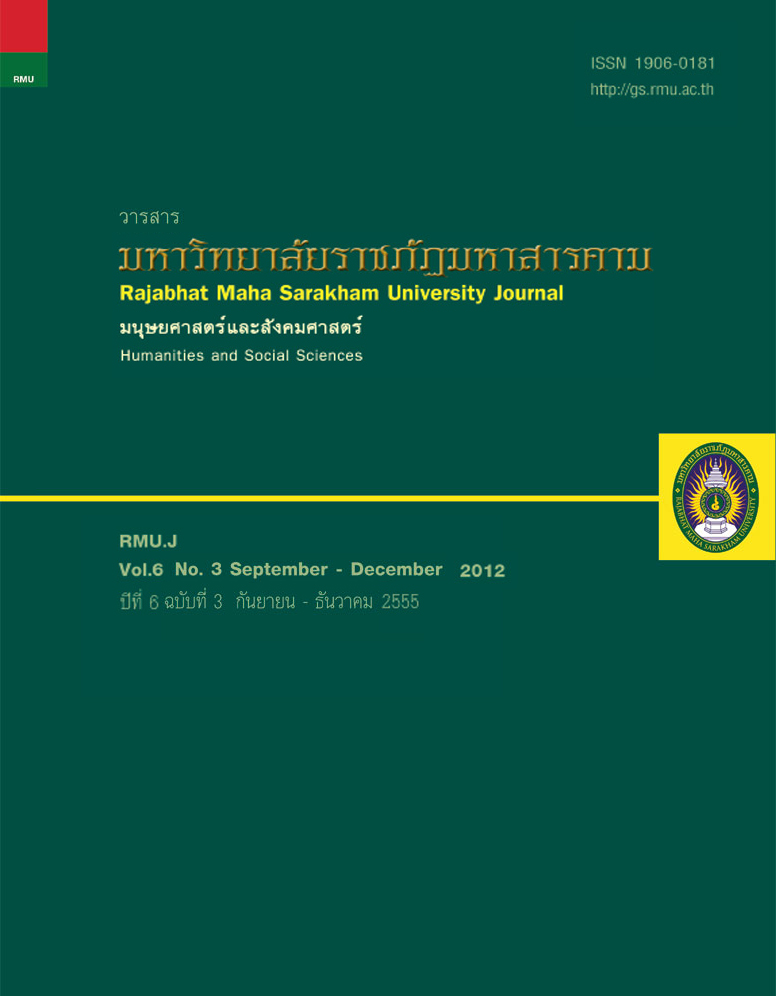ยุทธศาสตร์การพัฒนาการท่องเที่ยวอย่างยั่งยืนของจังหวัดนครราชสีมา
Main Article Content
บทคัดย่อ
บทคัดย่อ
การวิจัยครั้งนี้มีวัตถุประสงค์ ประการแรก เพื่อศึกษาสภาพปัจจุบันปัญหาในการจัดการการท่องเที่ยวของจังหวัดนครราชสีมา ประการที่สอง เพื่อศึกษาปัจจัยที่มีผลต่อยุทธศาสตร์การพัฒนาการท่องเที่ยวอย่างยั่งยืนของจังหวัดนครราชสีมา และ ประการที่สาม เพื่อศึกษา ยุทธศาสตร์ที่เหมาะสมกับการพัฒนาการท่องเที่ยวอย่างยั่งยืนของจังหวัดนครราชสีมา โดยใช้การวิจัยแบบผสมที่มีทั้งเชิงปริมาณและ เชิงคุณภาพ การวิจัยเชิงปริมาณทำการรวบรวมข้อมูลงานวิจัย แนวคิด ทฤษฎีต่างๆ ที่เกี่ยวข้อง เพื่อนำมาสร้างแบบสอบถามสำหรับ เป็นเครื่องมือในการวิจัย ทำการเก็บข้อมูลจากกลุ่มตัวอย่างที่เป็นนักท่องเที่ยวในจังหวัดนครราชสีมา โดยการสุ่มตัวอย่างแบบบังเอิญ (Accidental sampling) รวมทั้งหมด 468 ตัวอย่าง ส่วนการวิจัยเชิงคุณภาพเก็บข้อมูลโดยการสัมภาษณ์เชิงลึกโดยกลุ่มตัวอย่าง แบบเจาะจง (Purposive sampling) จากบุคลากรผู้เชี่ยวชาญภาครัฐ ภาคเอกชน รวมถึงภาคประชาชนและองค์กรท้องถิ่น จำนวน 18 คน และเสนอผลการวิจัยโดยวิธีพรรณนาวิเคราะห์ ผลการวิจัยพบว่า
1. สภาพปัจจุบันและปัญหาในการจัดการท่องเที่ยวของจังหวัดนครราชสีมา พบว่า มีการดำเนินการอยู่ในระดับมากทุกด้าน โดยมีการดำเนินการด้านการบริหารภาคเอกชน อยู่ในระดับสูงสุด รองลงมาคือ ด้านการบริหารภาคประชาชนและองค์กรท้องถิ่น และ ด้านการบริหารภาครัฐ ตามลำดับ
2. การบริหารภาครัฐ การบริหารภาคเอกชน และการบริหารภาคประชาชนและองค์กรท้องถิ่น เป็นปัจจัยที่มีผลต่อยุทธศาสตร์ การพัฒนาการท่องเที่ยวอย่างยั่งยืนของจังหวัดนครราชสีมา
3. ยุทธศาสตร์ที่เหมาะสมกับการพัฒนาการท่องเที่ยวอย่างยั่งยืนของจังหวัดนครราชสีมา จากการสังเคราะห์ผลที่ได้จาก การวิจัย มี 4 ยุทธศาสตร์ คือ
ยุทธศาสตร์ที่ 1 ยุทธศาสตร์การบริหารภาครัฐ ประกอบด้วย 5 ยุทธวิธี คือ 1) การสนับสนุนนโยบายการท่องเที่ยวและสิ่ง อำนวยความสะดวก 2) การร่วมมือส่งเสริมการลงทุน 3) การร่วมมือพัฒนาผู้ประกอบการ 4) การร่วมมือพัฒนาแหล่งท่องเที่ยวใหม่ 5) การหาตลาดอย่างมีวิสัยทัศน์
ยุทธศาสตร์ที่ 2 ยุทธศาสตร์การบริหารภาคเอกชน ประกอบด้วย 4 ยุทธวิธี คือ 1) การร่วมพัฒนาผลิตภัณฑ์เพื่อยกระดับ การท่องเที่ยว 2) การส่งเสริมพัฒนาท้องถิ่นเพื่อการตลาด 3) การร่วมมือพัฒนาบุคลากรท้องถิ่นด้านการท่องเที่ยว 4) การประสานงาน สร้างเครือข่ายการท่องเที่ยว
ยุทธศาสตร์ที่ 3 ยุทธศาสตร์การบริหารภาคประชาชนและองค์กรท้องถิ่น ประกอบด้วย 5 ยุทธวิธี คือ 1) การมีส่วนร่วมในการ รักษาระบบนิเวศน์ วัฒนธรรม และประเพณี 2) การมีส่วนร่วมขององค์กรท้องถิ่น 3) การสร้างจิตสำนึกปกป้องผลประโยชน์แหล่ง ท่องเที่ยว 4) การใช้ทรัพยากร และการดูแลผลประโยชน์แหล่งท่องเที่ยวของชุมชน 5) การให้บริการที่ดี และการรักษาความปลอดภัย
ยุทธศาสตร์ที่ 4 ยุทธศาสตร์ความร่วมมือระหว่างภาครัฐ ภาคเอกชน ภาคประชาชนและองค์กรท้องถิ่น ประกอบด้วย 4 ยุทธวิธี คือ 1) การพัฒนาการท่องเที่ยวเพื่อสังคม วัฒนธรรม พัฒนาจิตใจและปลูกจิตสำนึก 2) การพัฒนาองค์กรแบบบูรณาการอย่างยั่งยืน 3) การพัฒนาการท่องเที่ยวเพื่ออนุรักษ์สิ่งแวดล้อม 4) การพัฒนาการท่องเที่ยวเชิงเศรษฐกิจ
ผลการวิจัยที่ค้นพบสามารถนำไปประยุกต์ใช้ในการกำหนดยุทธศาสตร์การพัฒนาการท่องเที่ยวอย่างยั่งยืนของจังหวัด นครราชสีมาได้อย่างมีประสิทธิภาพ
คำสำคัญ : ยุทธศาสตร์การพัฒนา, การท่องเที่ยวอย่างยั่งยืน
ABSRTACT
The objectives of this research were to 1) study current conditions and problems of tourism manage- ment of Nakornratchasima Province, 2) study factors affecting strategies for sustainable tourism develop- ment, and 3) study suitable strategies for sustainable tourism development of Nakornratchasima Province. This mixed-methodology research made use of both quantitative and qualitative data: quantitative data were synthesized from related research, concepts and principles to construct the questionnaire to be used as the instrument for this research to collect data from the sample group consisting of 468 key informants or tourists in Nakornratchasima obtained through accidental random sampling; while qualitative data were collected through in-depth interviews of 18 experts obtained through purposive sampling from both government and private sectors, including the general public and local administration organizations; and findings were de- scriptively analyzed and presented. Research results are as follows:
1. The current conditions and problems regarding tourism management in Nakornratchasima Province were found at the high level in every aspect; with management of the private sector found with the highest mean score, followed by management of the general public,local organization management, and manage- ment of the government sector, respectively.
2. Managements of the government sector, private sector, general public sector and management of local organizations were factors affecting the strategies for sustainable tourism development of Nakornrat- chasima Province.
3. The four strategies synthesized from research as suitable for sustainable tourism development of Nakornratchasima Province were as follows:
Strategy 1, Management of the government sector, consisted of 5 tactics: Supporting tourism policies and facilities, 2) Cooperating in Investment Promotion, 3) Supporting development of entrepreneurs, 4) Co- operating in development of new tourism attractions, and 5) Marketing with visions.
Strategy 2, Management of the private sector, consisted of 4 tactics: Cooperating in improving tourism products, 2) Supporting local development for marketing, 3) Cooperating in development of local tourism personnel, and 4) Creating and coordinating tourism networks.
Strategy 3, Management of the public sector and local organization management consisted of 5 tactics: 1) Participating in conservation of ecological systems, culture and traditions, 2) Involving local organizations, 3) Raising awareness and conscience in protection of public interest in tourist attractions, 4) Being responsible for utilizing local tourism resources, and 5) Providing quality services and safety.
Strategy 4, Cooperation with the government sector, private sector, public sector and local organization management, consisted of 4 tactics: 1) Tourism development for community & culture ,and raising awareness & conscience, 2) Focus on integrated and sustainable organizational development, 3) Tourism development for environmental conservation, and 4) Tourism development for economy.
Findings of this research can be effectively applied in establishing strategic plans for sustainable tour- ism development of Nakornratchasima Province.
Keywords : Strategies of Development, Sustainable Tourism
Article Details
1. บทความที่ลงตีพิมพ์ทุกเรื่องได้รับการตรวจทางวิชาการโดยผู้ประเมินอิสระ ผู้ทรงคุณวุฒิ (Peer Review) สาขาที่เกี่ยวข้อง อย่างน้อย 3 ท่าน ในรูปแบบ Double blind review
2. ข้อคิดเห็นใด ๆ ของบทความที่ลงตีพิมพ์ในวารสารมหาวิทยาลัยราชภัฏมหาสารคาม นี้เป็นของผู้เขียน คณะผู้จัดทำวารสารไม่จำเป็นต้องเห็นด้วย
3. กองบรรณาธิการวารสารมหาวิทยาลัยราชภัฏมหาสารคาม ไม่สงวนสิทธิ์การคัดลอกแต่ให้อ้างอิงแสดงที่มา


